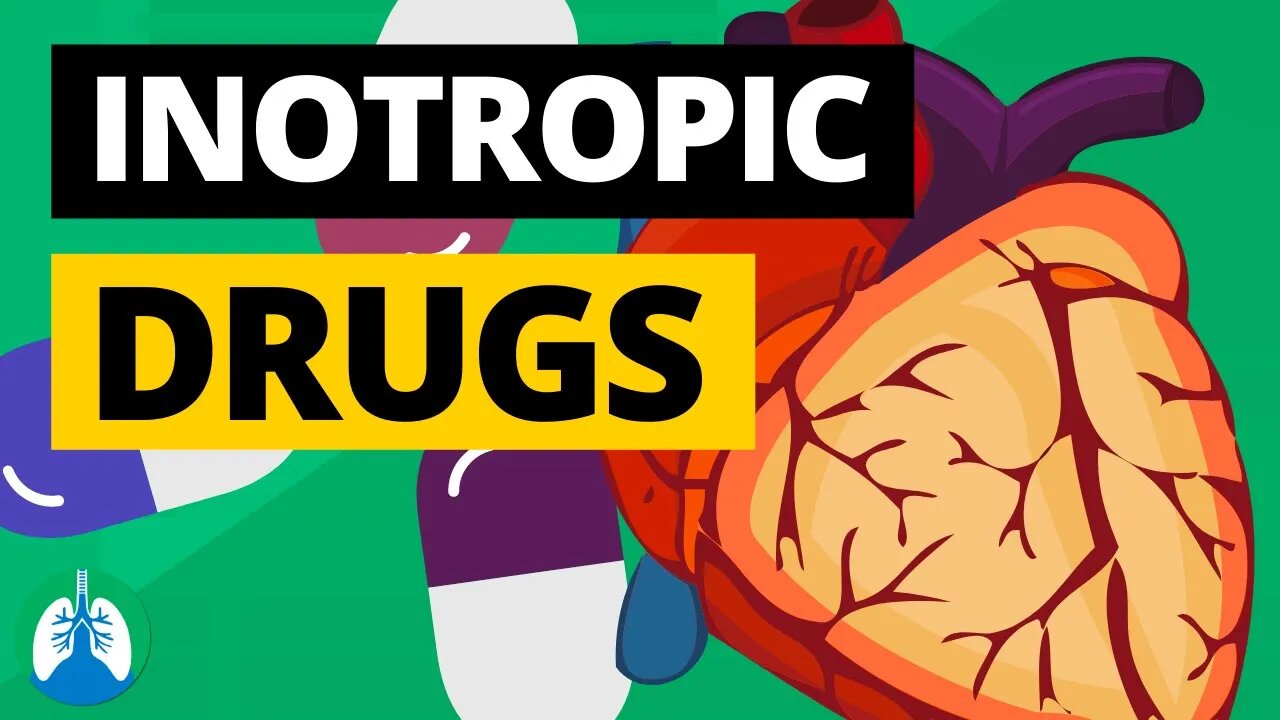Premium Only Content

Inotropic Drugs (Medical Definition) | Quick Explainer Video
What are Inotropic Drugs? This video covers the medical definition and provides a brief overview of this topic.
💥Cardiovascular Drugs [Full Guide] ➜ ➜ ➜ https://bit.ly/2YBe0WY
➡️ Cardiovascular Drugs
When it comes to pharmacology in respiratory care, most people only think about the medications that are given to affect the lungs. The heart and cardiovascular system is often overlooked. Respiratory therapists are trained to provide care for patients with conditions of both the heart and lungs. These two major organs work together to pump oxygenated blood to all of the cells and tissues within the body. If a disease is inhibiting the functionality of the heart, it could inadvertently affect the lungs as well. Cardiovascular drugs are an important class of medication to learn and understand. There are a few primary types, however, for this video, we're specifically focusing on:
➡️ Inotropic Agent Types:
1. Positive Inotropes
2. Negative Inotropes
➡️ Negative Inotropic Agents
Negative inotropic agents decrease the contractility of the heart, however, this class of drugs overlaps with antiarrhythmic agents which is a topic that we've covered in a separate video here on our channel.
➡️ Positive Inotropic Agents
Positive inotropes work by increasing the force and contractility of the heart. They are often administered in adult patients for the treatment of Congestive Heart Failure (CHF). They're also useful in conditions that cause low cardiac output such as cardiogenic shock.
➡️ Types of Positive Inotropic Agents
- Digitalis
- Digoxin
These are cardiac glycoside drugs that increase myocardial contractility which is beneficial in patients with conditions that cause a low cardiac output. They are also useful in treating atrial arrhythmias as well. Digoxin may be indicated for the treatment of fetal supraventricular tachycardia.
Negative inotropic agents have the opposite effect and work by decreasing the force of cardiac contraction. Some other types of cardiovascular drugs to be familiar with include antiarrhythmic agents, vasodilators, antianginal drugs, and vasopressors. For this video, we just wanted to provide you with a brief overview of this topic.
💥Cardiovascular Drugs [Full Guide] ➜ ➜ ➜ https://bit.ly/2YBe0WY
—————
📗 BEST STUDY GUIDES FOR YOU
▪ TMC Test Bank 👉 http://bit.ly/2IGeqSu
▪ Hacking the TMC Exam 👉 http://bit.ly/2XBc8do
▪ TMC Exam Bundle (Save $) 👉 https://bit.ly/34pqEsV
▪ Daily TMC Practice Questions 👉 http://bit.ly/2NnXh3C
💙MORE FROM RTZ
▪ Free TMC Practice Exam 👉 http://bit.ly/2XlwASL
▪ Free RRT Cheat Sheet 👉 http://bit.ly/2IbmOKB
▪ Resources for RT's 👉 http://bit.ly/2WVV5qo
▪ Testimonials 👉 http://bit.ly/2x7b5Gl
🌐FOLLOW US
▪ Instagram 👉 http://bit.ly/2FhF0jV
▪ Twitter 👉 http://bit.ly/2ZsS6T1
▪ Facebook 👉 http://bit.ly/2MSEejt
▪ Pinterest 👉 http://bit.ly/2ZwVLPw
🚑MEDICAL DISCLAIMER
This content is for educational and informational purposes only. It is not intended to be a substitute for professional medical advice, diagnosis, or treatment. Please consult with a physician with any questions that you may have regarding a medical condition. Never disregard professional medical advice or delay in seeking it because of something you watch in this video. We strive for 100% accuracy, but errors may occur, and medications, protocols, and treatment methods may change over time.
💡AFFILIATE DISCLAIMER
This description contains affiliate links. If you decide to purchase a product through one of them, we receive a small commission at no cost to you.
—————
⏰TIMESTAMPS
0:00 - Intro
0:19 - Cardiovascular Drugs
1:06 - Inotropic Agent Types
1:14 - Negative Inotropic Agents
1:29 - Positive Inotropic Agents
1:51 - Types of Positive Inotropic Agents
—————
🖼CREDIT FOR MUSIC AND GRAPHICS:
▪ Music licensed from Audiojungle.net/
▪ Graphics: Canva.com, Freevector.com, Vecteezy.com, and Pngtree.com
#CardiovascularDrugs #InotropicDrugs #Pharmacology
-
 3:17
3:17
Respiratory Therapy Zone
1 year agoWhat is Silicosis? (EXPLAINED) 🫁
498 -
 12:11
12:11
Nikko Ortiz
2 days agoCrashout 6 Rumble
82K8 -
 19:56
19:56
GritsGG
13 hours agoSpectating Random Solo Players in a Bot Lobby!
4.76K1 -
 LIVE
LIVE
Lofi Girl
2 years agoSynthwave Radio 🌌 - beats to chill/game to
328 watching -
 16:22
16:22
BlabberingCollector
2 days agoHarry Potter HBO: Addressing Some New Rumors!
4.57K2 -
 4:01:30
4:01:30
Badlands Media
21 hours agoThe Narrative Ep. 37: The Sovereign War
178K34 -
 11:23:54
11:23:54
SpartakusLIVE
13 hours agoMega SOLO Spartan Stream - 12 hours?! HA || Variety Later?!
106K -
 4:55:23
4:55:23
Rallied
6 hours ago $20.35 earnedSolo Warzone Challenges All Night
50.3K3 -
 4:53:38
4:53:38
Due Dissidence
16 hours agoTaibbi DEFENDS Weiss-CBS Deal, Pakman Producer SPILLS TEA, Massie CALLS OUT Trump Informant Claims
33.2K42 -
 2:33:47
2:33:47
TheSaltyCracker
9 hours agoMedia Silent on Metro Attack ReeEEStream 9-07-25
152K292